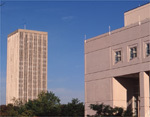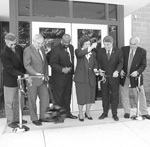

BOOK/ENDS
Conference Set for Oct. 11-14
By Vinny Reda
In a movable feast of lectures, panel presentations,
artistic exhibitions, workshops and open forums, an international collection
of theorists, educators and artists will gather in the Capital Region
Oct. 11-14 to discuss the future of the humanities in the light of technological
change.
BOOK/ENDS, hosted by one University center and two departments, will explore ongoing transformations of the book and printed document and the redefinition of the arts and humanities in the digital age.
�The conference is unique in the sense that it combines academic theorizing with the work of several artists, as well as local community involvement, to explore the many ideas being presented,� says David Wills, chair of the Department of Languages, Literatures and Cultures, and co-organizer of the event.
Through its diverse perspectives, BOOK/ENDS will look at new pathways of communication opening up through electronic resources and explore how these technologies are reinventing cultural and knowledge-production, as well as offering new challenges for the arts and humanities in higher education.
Locales for the BOOK/ENDS conference include UAlbany�s Uptown and Downtown campuses, the Science Library Atrium, The Egg, the Albany Center Galleries, and the Arts Center of the Capital Region in Troy. Concurrent with the conference are exhibits by local and regional artists at the Albany Center Galleries, by invited internationally renowned artists at the Arts Center in Troy, and a program of site-specific poetry and performance installations at the Albany International Airport.
Conference participants include French philosopher and �inventor� of deconstruction, Jacques Derrida, Peggy Kamuf, professor of comparative literature at the University of Southern California, Brian Massumi, UAlbany English faculty member and specialist in theories of perception, new media and cultural studies, and Brian Rotman, a leading scholar and theorist of the relationship between mathematics and the humanities.
Artists, writers and designers include Gary Hill, Toni Dove, Stelarc, Mark Amerika, Alan Sondheim, Johanna Drucker, Bruce Mau and Xu Bing.
�Their work addresses issues on the interfaces between art and technology by means of online and hypertext writing, video and virtual reality, the use of books as art, and performance,� said Sandra Buckley, BOOK/ENDS co-organizer and director of the Center for Arts Humanities, which, along with the departments of English and Languages, Literatures and Cultures, are conference hosts.
�Discussions at the conference among scholars and artists will focus on how new technologies are altering the boundaries between writing and image, human and machine, and narrativity and corporality,� she added. Another feature of BOOK/ENDS is the participation of Albany public school students in a bookmaking and online writing study module. The students will come together with their teachers, writer Sondheim, philosopher Derrida and local artists, poets and academics, for a workshop and discussion session during the conference.
The BOOK/ENDS conference begins on Wednesday, Oct. 11, at 8 p.m. in The Egg in downtown Albany with a presentation of �Zombies and Cyborgs: Absent, Obsolete and Involuntary Bodies� by Australian performance artist Stelarc, and will culminate on Saturday, Oct. 14, at 7 p.m. with a cocktail reception at the Albany Center Galleries.
For more information or to register for the conference, log on to the BOOK/ENDS website at www.albany.edu/bookends. On-line registration is $90 ($60 for faculty, $50 for students). Exhibits are free and open to the public. Admission to conference sessions is open to registered participants only, with two exceptions.
These are the Stelarc presentation, for which tickets may be purchased online at the conference website or at The Egg Box Office ($15 general admission, $12 student admission), and the Oct. 12 Derrida roundtable at Page Hall, which will be sold at the door ($10 for non-registrants).
Additional questions may be directed to BOOK/ENDS via email, at: bookends@albany.edu, or by phone, (518) 437-3631.
A limited number of scholarships are available for UAlbany UUP members at the faculty registration rate of $60. In addition, several SUNY-wide scholarships of $100 are available (to cover the $60 faculty registration plus $40 for travel expenses). To apply for a UUP conference scholarship, send a one-paragraph statement of your interest in the conference and its relation to your research, mentioning two to three relevant publications, to: bookends@csc.albany.edu.
UAlbany Research
Unit Granted $5.3 Million to Enhance Effective Literacy Instruction
By Vinny Reda
The U.S. Department of Education (U.S. ED) has awarded
the University at Albany�s National Research Center on English Learning
& Achievement (CELA) an additional $5.3 million to extend its national
leadership on student learning and achievement in new school settings.
The two-year award will aid CELA in finding ways to help additional schools improve students� learning and achievement in English and language arts while studying the effects of the intervention.
For the next three years, supported by U.S. ED�s Office of Educational Research and Improvement, CELA will partner with 18 such schools to implement an instructional development program. The program aims to improve teachers� knowledge, skills, and understandings about what their students are capable of doing and to provide strategies for them to act on this new knowledge in the classroom.
Since receiving its first award in 1987, CELA�s research teams have been national leaders in learning what works in schools where students perform well in English. According to center director Judith A. Langer, �When certain things are not in place in a school or district, even good teachers who are using effective instructional practices do not get the same results as teachers using similar practices in a supportive school environment.� This is especially true, she said, for schools that serve poor, diverse student bodies.
Along with fellow UAlbany School of Education Professor Arthur N. Applebee, Langer directs the center, which includes eight additional faculty from the school and an additional five at UAlbany�s partner in the program, the University of Wisconsin-Madison.
�The next step for this team of researchers,� says Applebee, �is to learn how to put into place the features that we have learned are important - the plans, programs, and processes that make it possible for all students in a school to be successful in English.�
Researchers in the new program will assess the effectiveness of the intervention and compare its results to those from a set of similar comparison schools.
Center staff invite interested middle schools to contact them about joining this Partnership for Literacy. Those selected will be paired and randomly assigned to the intervention or comparison group in the first year. In the second year, the comparison schools will receive the intervention, thus enabling researchers to also compare results from one year to the next.
Schools chosen for the program will be middle schools in New York and Wisconsin and will include schools in a variety of communities and contexts, with an emphasis on those that serve poor, underperforming youth.
Some of the research findings that will be incorporated into CELA�s work with the schools include the importance of:
- engaging students in thought-provoking activities that involve challenging skills and subject matter,
- using diversity to enhance learning, u increasing the cohesiveness of curriculum and instruction,
- raising the level of student engagement in higher order talk and writing, u aligning curriculum with assessment,
- supporting students as they perform new and difficult tasks, and
- helping struggling readers. In addition, it is important that teachers in the new program
- continually reflect on all aspects of their teaching and their students� progress,
- understand theories about how students learn and have instructional strategies for teaching literacy, and
- develop as a professional community of reflective teachers.
For more information about the Partnership for Literacy, contact the center at (518) 442-5026; visit http://cela.albany.edu for more information about CELA.
Home Page/ Front Page/ Campus News/ Features/ Sports/ Date Book
|
The University�s new, state-of-the-art Public Safety Building, located on the east side of the Uptown Campus, officially opened Friday afternoon. President Karen R. Hitchcock, third from right, is joined by (from left) Dan Langer of Collins and Scoville Architects; Bruce McBride, the State University of New York's assistant vice chancellor for University Life and University Police; Police Chief J. Frank Wiley; state Assemblyman Jack McEneny; and James Doellefeld, vice president for Student Affairs. |

